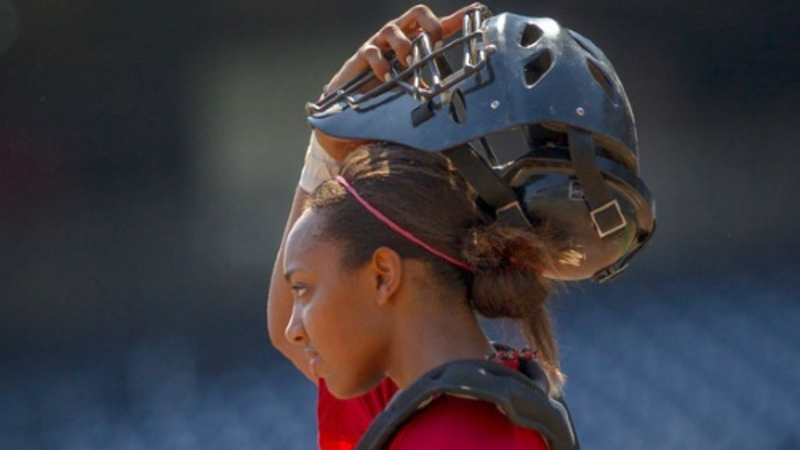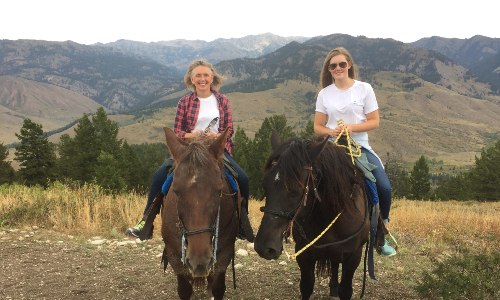Get Inspired
"It's Fine, I'm Fine": Stephanie Everett's Story
Stephanie Everett, a junior studying a modification of Theater and African American studies at Dartmouth College, had three concussions between her high school and college athletic career. She suffers from Post-Concussion Syndrome (PCS) as a result of her last concussion nearly two years later. She wrote and starred in an autobiographical one person play, titled "It’s Fine, I’m Fine", detailing the difficulty of living with PCS and in describing her symptoms to those that don’t understand. She performed her play in early 2018 at the New Works Now festival for an audience of over 200 people.

Posted: May 11, 2018
By, Stephanie Everett
“You are what you’ve overcome,” reads the military dog tag that hangs from my neck. Today and every day, it is a symbolic and physical reminder of how far I’ve come in the three years since choosing to apply to Dartmouth College instead of West Point.
With one concussion under my belt from my final high school baseball days, I walked onto the Dartmouth varsity soccer team as a goalie. Two weeks into practice, I was knocked on the temple by a stray shot I didn’t see coming. Exactly one year later, I took a ball to the nose during a scrimmage. All three times, I felt fine – just “shook it off” and continued with practice. It wasn’t until the following morning that tremendous pressure would fill my head, signaling something was wrong.

As athletes, we are conditioned to think we are invincible. We have to perform at 110% every time we hit the field, and are pushed back into playing before injuries (to the brain or otherwise) are fully healed. I fell victim to that competitive nature, returning to play when I was “good enough,” not good. There was no doctor mandating I stop contact sports. I was the only person who knew how my head was doing, and was the only person who could decide my future.
I started to feel more insecure than ever. I was going through the motions, listening to the same prognosis from doctor after doctor, and sitting on the sideline every day at practice. I was unhappy and unfulfilled, but unable to admit it to myself. I thought being an athlete was everything. As a ballerina, soccer, and baseball player from the age of four, “athlete” was the only identity I’d ever stuck with. But after nine months of school, waking up every day feeling the same – or worse – than the day before, I started to come to grips with the decision I knew I had to make.
Little did I know that trading my cleats in for character shoes in the spring of my sophomore year would finally bring me home. Theater was the last activity to be cut from my schedule when I committed to college soccer, but the first one I returned to after quitting. I took my first college theater class that spring, and fell so in love with it that I found myself interning this past fall at Northern Stage, a regional theater in Vermont run by one of Dartmouth’s professors, Carol Dunne. It was during this internship that I learned about marketing, development, and education in the theater sphere, and got my first professional acting contract. Dunne pushed me to pursue writing in my free time, knowing that I was still struggling with Post-Concussion Syndrome (PCS). Though I truly couldn’t think of anything scarier, I agreed to dive into a one woman show on my own experience with head trauma... “my diary – staged,” as the play begins.
For over a year, by that point, I had practiced shutting the bad out, afraid that sinking into the negatives of PCS would make my recovery even longer. Writing this play, ironically titled “It’s Fine, I’m Fine,” became a way for me to finally put into words everything I couldn’t before.
But it’s not just a play about a headache.
“It’s Fine, I’m Fine” is about the invisible. Anyone who has dealt with TBI and PCS knows that our symptoms aren’t our only trouble, and we certainly know that they’re never conveniently-timed. “It’s Fine, I’m Fine” is about transitions and self-discovery. About losing direction and letting go. About relationships and sexuality. About mental health and the therapist my parents don’t know exists. It’s an ode to the twists, turns, and deep dives in adolescence that we mask with “I’m fine.”

Maman’s Cooking
When Maman – that’s French for Mom – cooks,
you best stay out her way.
By the time I wake on Saturday mornings,
the smells slipping through the
space under the door
are a delightfully confusing mix of
roasting garlic and
Vermont maple syrup.
She’s up at the crack of 9am to begin that evening’s meal
just as dad finishes breakfast.
By the time I reveal myself,
she is two countertops-deep in
the dish of the day.
Clanging pots and pans,
she doesn’t care –
if she’s up,
so, too,
should the world
be.
From the sunporch
comes the banging of drums and African dialects.
Music from
Senegal,
Ghana,
la Cote D’Ivoire –
in this, Maman does not discriminate.
And so we have Saturday morning:
sound waves and scents
wafting and weaving
together in
sweetly-savored harmony.
But now
when memories like these pull me back home,
I can do nothing but sit and stare –
knowing that full meals of this
will end in misery.
Like dessert on a too-full stomach,
Maman’s cooking is too rich,
too heavy.
Bogging down my foggy mind.
No,
rabbit food will have to do.
Sometimes I fail, and I indulge.
Feeling, in those 20 minutes
before my new plateau derails,
that everything is back to normal.
And I am just home
on a Saturday morning...

My friends, my family, my community – they all know me as the confident, put-together girl who bounces from one extracurricular to the next with apparent ease. This show is my way of taking the mask off, even if just for an hour. This show is me admitting that sometimes I’m scared out of my mind, that sometimes I’m weak, that sometimes I cancel plans to go home and cry on my dorm room floor. The state of my head is my first thought in the morning, and most often the determinant of my bed time. I feel trapped by the things I have to do, or the food I have to eat, or the events I have to miss just to keep the muscle tension from getting worse than it is to start. In the show, I reference the exact number of days I’ve been dealing with the symptoms of my third concussion. When I was writing, that number was in the 300s. A week ago, that number doubled.
But I am a happier person than I was at 300, and miles above where I was at 0. I found my way back to theater, and know wholeheartedly that it is what I want to pursue for the rest of my life. There is no better feeling than telling stories night after night that matter, that change lives. If my show makes just one more person think twice before making assumptions, I’ll be happy. I know this is what I am called to do – finding the silver linings, inspiring compassion, and making the invisible visible.
You May Also Like
PCS may not go away immediately, but it almost always will with time. Check out the treatment options that may work for your symptoms.
PCS Treatments
Esther Lovett has struggled with PCS since middle school. She is now a beacon of hope for others struggling with symptoms for sharing her most personal, painful and inspiring experiences with PCS.
Check out Esther's PCS Blog